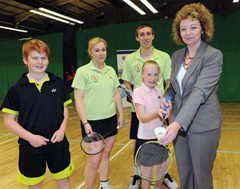Ministerial Q&A: Carál Ní Chuilín
 agendaNi asks Sports Minister Carál Ní Chuilín about her priorities and commitments over the new Assembly’s term.
agendaNi asks Sports Minister Carál Ní Chuilín about her priorities and commitments over the new Assembly’s term.
In brief, what are your ambitions for sport?
One of the five priorities of the Executive is to promote tolerance, inclusion, health and well-being. Sport is a key vehicle for achieving this.
Greater physical activity reduces obesity and promotes well-being, which improves physical and mental health. This, in turn, has benefits across society, both tangible and intangible. Sport can and does make a very real difference in people’s lives: people of all ages, backgrounds and abilities.
What are your personal first impressions of the Sport Matters strategy? Is it achievable and do you plan to make changes?
The strategy is a comprehensive document setting out the sporting issues to be addressed, targets to achieve success, the benefits to be achieved and the costs of delivery.
It has quite rightly been developed in consultation with all the key stakeholders and is all the more robust for having done so.
It highlights the many organisations involved in delivering the strategy and, to its credit, sets out the structures that need to be in place to assure delivery in the 10-year lifespan.
It is rightly an ambitious strategy and must be achievable over the 10 years as it is intended to address basic sporting needs in the North of Ireland. Implementation will be challenging but it is achievable if everyone involved on the Sport Matters Monitoring Group and those represented on the various Sport Matters implementation groups maintain their commitment.
At an abstract level, what is the rationale for investing in sport when other public services are under financial pressure?
The case for investment at both an abstract and practical level is made very clearly in Sport Matters and I would refer you specifically to Chapter 8 and Appendix 1 of Sport Matters, which covers the cost of doing nothing and the importance of sport.
Your department is spending £138 million to upgrade stadiums. Would that money would be better invested in getting more people to play sport?
Successive executives have agreed that the people in the North of Ireland deserve stadiums that are both safe and fit for purpose for spectators who go to watch the three main ball sports here.
The sports have suffered for many years from a lack of investment in major stadiums. Added to that, the stadiums provide a major funding source for each of the sports and the profits from the hosting of major sporting fixtures are re-invested in grassroots sports.
Over the next year, what will you do to ensure Northern Ireland benefits from the London 2012 Olympics?
Good progress has already been made in realising benefits for the North from the London 2012 Olympic and Paralympics Games.
With just over 12 months to go before the 2012 Olympic Torch Relay arrives here, DCAL will now focus on delivering the torch relay, the live sites in Belfast and Derry, providing support for the Land of Giants project and other Cultural Olympiad programmes, supporting and encouraging volunteering opportunities, and promoting the North of Ireland as a destination for pre-games training camps and qualifying events.
DCAL will also continue to work with Invest NI and local government to maximise opportunities for local businesses.
These activities will deliver both short-term benefits and a lasting legacy. They will enable us to develop the capacity and confidence to deliver other high quality, high impact major events and celebrations in the North throughout 2012 and 2013.
When do you hope to reinstate the Places for Sport programme for community level sports clubs?*
There is an ongoing Places for Sport programme being taken forward in the four-year CSR period. It is titled the Sport Matters Community Capital Sports Programme. Through this programme, £9.5 million will be invested in facilities at community level.
Your manifesto commits you to increasing quality sporting provision for all minority groups? How do you plan to carry this commitment out?
DCAL has a lot to offer, not just in terms of sport but also in relation to the other aspects of culture, arts and leisure. But we have to make sure that people who are hard to reach are engaged; it’s about breaking down misconceptions and barriers, and providing access. That doesn’t take a pile of money; it takes good ideas and initiative.
What are your own sporting interests?
I come from a GAA family, and hurling is my favourite sport to watch. It’s an amazing game: it’s fast, so much pace. I see how sport makes a real and meaningful difference in people’s lives. Especially since I took up the post of Minister, I have seen this impact on those who take part in sports, those who spectate and those who volunteer in all areas of sport.
What would you hope to achieve during your term as Minister responsible for sport?
Echoing what is outlined above, one of the key things is making sure we reach out to hard-to-reach communities, and that we use sport and physical activity as a way of promoting better physical and mental health.
The priority is around following objective need; we have a challenge in making sure communities avail of opportunities, and that money spent will have a direct impact.
* Sinn Féin Assembly manifesto commitment (2011)





